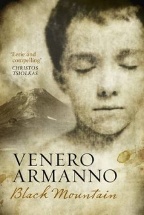Black Mountain by Venero Armanno

University of Queensland Press, 2012. ISBN 9780702239151.
This eerie tale recounts the horrors of the Sicilian sulphur mines
while imagining the future of scientific exploits into genetic
engineering.
When twenty-two year old Mark Alter inadvertently plagiarises from
the novel Black Mountain by Cesare Montenero, he begins a
journey to find the old author and eventually finds himself. The
story within a story follows Cesare Montenero from his earliest
memories as an abandoned child through his exploitation as a child
labourer in a tile factory to his time as a child slave in the
horrific sulphur mines, his escape and eventual rescue by Domenico
Amati. Cesare's saviour harbours secrets, which Cesare instinctively
feels have something to do with him and he is right. Both men
are products of genetic engineering, experiments that have been
carried out in secret and were started by the Amati family with
their wealth accumulated from their sulphur mines. In reading
Cesare's story, Mark realises that he also belongs to this group of
engineered people.
The author evokes sympathy for the victims of this experimentation
and a questioning of the ethical and moral responsibility of the
people in control. These current and contemporary ethical dilemmas
will engage students, although the detail in recounting Cesare's and
Domenico's experiences makes this novel more suitable for senior
students, Year 10 and up. Although very different stories, Black
Mountain and Kazuo Ishiguro's Never Let Me Go would
make an excellent pair for senior English students.
Linda Koopman